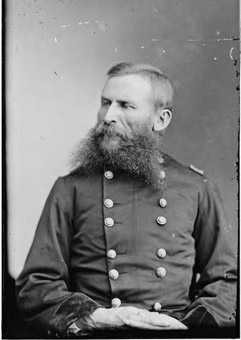

Library of Congress photo (LC-DIG-cwpbh-04032)
Entering the Military Academy in 1848, George Crook was brevet
2nd lieutenant, 4th
U.S. Infantry in July, 1852. He was promoted
to 2nd lieutenant, 4th Infantry, in July of 1853 and promoted
to
1st lieutenant in March of 1856. He was part of the Rogue River
expedition in 1856 and in command
of an expedition of the Pitt
River in 1857. In June of 1857 he was in a skirmish during which
he was
wounded with an arrow. He was promoted to captain in
May of 1861.
George Crook was promoted to Colonel, 36th Ohio Volunteers,
in September of 1861. In
May of 1862 he was brevet Major United
States Army for gallant and meritorious services at the battle of
Lewisburg, Virginia (during which he was wounded). He was
promoted to Brigadier General of
volunteers in September of 1862
and was engaged in the battles of South Mountain and Antietam.
Crook
was brevet Lieutenant Colonel United States Army in
September, 1862, for gallant and meritorious services
at the battle
of Antietam. In 1863 he participated in battles and skirmishes in
Hoovers Gap and
Chickamauga. He was part of the forces in
pursuit of General Wheeler and participated in actions
agains
guerrillas from Shelbyville, Tennessee to Rome, Georgia. In 1864
he saw action at Cloyd'
Mountain and New River Bridge and was
engaged in almost continuous skirmishing from Lewisburg to
Lynchburg, Virginia. Crook was brevet Colonel United States
Army in October, 1863, for gallant and
meritorious services at the battle of Farmington, Tennessee and was brevet
Major General United States
Volunteers in July of 1864 for gallant and distinguished services in West Virginia.
Also in 1864, George
Crook saw combat at Barryville and Strasburg and participated in the battles of Opequan,
Fisher's Hill
and Cedar Creek. He was promoted Major General United States Volunteers in October, 1864, and in
March of
1865 was placed in command of the Cavalry of the Army of the Potomac. He was engaged in the battle
of
Dinwiddie Court House, the pursuit of the rebel army, actions at Jetersville, the battle of Sailor's Creek, and
the
capitulation of Lee's army at Appomattox Court House. In March he was brevet Major General United
States Army
for meritorious services in the battle of Fischer's Hill.
In March of 1866 he was on an army board to examine rifle tactics. He was promoted
to Major, 3rd Infantry,
in July of 1866 and, also in July of 1866, was promoted to lieutenat colonel, 23rd
Infantry.
It is said that George Crook, while a lieutenant at Fort Ter-waw, started the
practice of shaving the tails of
unbroken mules - leading to the nickname of 'shave-tail' for new,
untested, 2nd lieutenants.